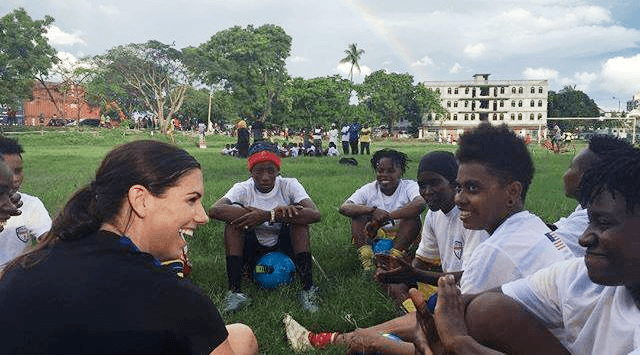By Melody Magly, GWU student (B.A Political Communication, SMPA 2020)

Caption: U.S. Soccer star Alex Morgan with young footballers in Tanzania.
As an undergraduate student studying abroad through the GW Madrid program, I was ready for a real culture change — especially in how I absorbed sports.
The soccer (futbol) team Real Madrid was everywhere once I got there: on scarves, on jerseys, on bumper stickers, and on hats. My favorite spot to study was right next to their stadium (Estadio Santiago Bernabeu) in a coffee shop with green bowls. My time studying abroad also happened to coincide with the Copa Libertadores Final game, which took place in Madrid and not El Salvador last year.
According to El Pais, the original November 2018 match of River Plate vs. Boca Junior was rescheduled when the original game in San Salvador broke down in violence. Restaging the match in Madrid cost $726,000 in extra security. There were about 4,000 police officers on patrol at Santiago Bernabeu at the time of the match, but it was expected to bring $42 million in revenue. Though huge sports events like this don’t happen very often, it made me interested in how sports play a role in policy relationships between countries.
I recently spoke to Matt Ferner, a Program Officer in the Sports Diplomacy section of the U.S. State Department, about how programmatic sports exchanges can play a role in international relations. The U.S. Sports Diplomacy office is under the Bureau of Educational and Cultural Affairs (exchanges) umbrella, and through its programs, bring foreign sports teams and coaches to the U.S. and sends American athletes and coaches abroad to learn about only sports techniques, and also U.S. culture.
“Sports are an avenue to promote certain life skills or values that we hold and it’s a way to bring in people, including women, girls, people with disabilities, and other people who wouldn’t have such opportunities,” said Ferner.
The Sports Diplomacy section is a small office of about six to seven employees who act as the chief liaisons between foreign diplomats and the U.S. State Department in the planning and execution of all U.S. sports programs abroad. Their work varies from bringing a group of Tanzanian soccer coaches to the United States, to bringing American soccer players to Europe.
“Sports is an avenue that diplomats can use even when the overall relationship with a country isn’t great. It can be used in many more situations,” Ferner said.
Global sports events, like the FIFA Women’s World Cup, are also an incredible opportunity to highlight these relations. Ferner spoke about using the FIFA WWC as an opportunity to expose girls abroad to American women’s soccer superstars like Alex Morgan, while also showcasing how more American girls play soccer at their schools and recreationally.
Ferner highlighted that women coming to the U.S. on sports exchanges also learn more about Title IX, and use that an inspiration to bring empowerment programs like that back to their home countries.
“We think by bringing folks to the U.S, people in other countries will gain a different perspective about Americans. We can break down stereotypes about what the U.S. and Americans are like and help them take greater charge of their own lives, too.”
From high-profile sports events like the FIFA Women’s World Cup and Copa Libertadores to small high school exchanges, sports diplomacy helps participants and countries score many goals.
